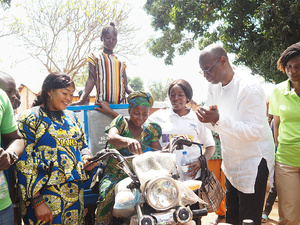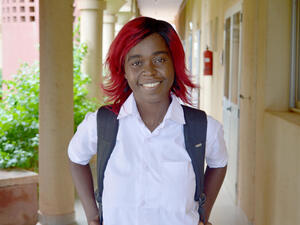More Ivorian refugees move into Liberia's camps
More Ivorian refugees move into Liberia's camps

Ivorian refugees moving from the Liberian border area to Little Wlebo refugee camp in Maryland county, Liberia.
HARPER, Liberia, July 21 (UNHCR) - For weeks, they stayed in the border areas hoping they could go home soon. But now thousands of Ivorian refugees are volunteering to move into Liberian camps while they decide on their future.
Since early July, more than 3,000 refugees from Côte d'Ivoire have been relocated from eastern Liberia's transit centres and host communities into camps further inland. Some of the refugees were moved from the Bishop Ferguson Transit Centre to the Little Wlebo refugee camp in Maryland county, while others have relocated from border communities in Grand Gedeh and Nimba counties to refugee camps that are being expanded to accommodate them.
Refugees relocating are mainly those uncertain about the future in Côte d'Ivoire or still traumatized by the violence at the height of the post-election crisis that started in November last year.
"I had a shop in Tabou. I had two wives and my family was happy," said Gogoua, 42, who moved into a camp recently. "During the crisis, one of my wives and one of my children were killed before my eyes because of my money. I was mercilessly beaten and wounded with bayonets. Look at the scars. I will never go back to Côte d'Ivoire."
The situation is gradually normalizing in Côte d'Ivoire, resulting in large numbers of returns, as well as substantially lower numbers of people fleeing. In recent weeks, the number of new arrivals into Liberia has gone down to a few dozen per week. Some said they were fleeing insecurity while others reported they had been individually targeted.
"I crossed over into Liberia with the hope of returning soon," said Hie, a 32-year-old Ivorian. "However, we still continue to receive reports of atrocities in Côte d'Ivoire. That is why I've decided to relocate with my family from the transit centre to the camp. I don't know when I will see my home again."
His countryman Kapet, 37, agreed on the importance of security. "I have a cocoa plantation in Tabou region but I can't return to Côte d'Ivoire," he said, citing existing tensions back home. "My desire now is to start farming activities here in Liberia."
So far UNHCR has established five refugee camps in eastern Liberia to host the refugees. These camps include Bahn in Nimba county and Little Wlebo in Maryland county, while Solo, Dougee and Ziah transit centres in Grand Gedeh county have been developed into camps. Services in these camps include food, clean water, healthcare, shelter and education. There is also land that refugees can farm.
During a recent visit to the camps, UNHCR's Representative in Liberia, Cosmas Chanda, noted, "We welcome the increase in relocation both for economic and security reasons as it will enable the LRRRC [Liberia Refugee Repatriation and Resettlement Commission], UNHCR and NGO partners to provide better assistance to refugees in camps than when they are scattered in more than 200 villages, which is a huge logistical challenge."
The five-month conflict in Côte d'Ivoire uprooted hundreds of thousands of civilians both within and outside of the country, including more than 153,000 Ivorians who crossed into Liberia.
By Sulaiman Momodu in Harper, Liberia






